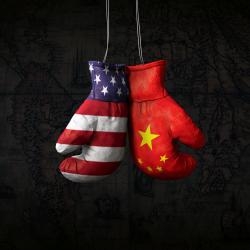
Constructing a dominant media narrative of military and nonmilitary conflicts can provide a country with bargaining leverage over the ‘enemy’ state. A classic example is the ongoing US-China ‘tech war’, where the global media narrative is dominated by the US side of the story, in which China’s access to advanced microchips to build state-of-the-art weapons is depicted as a major ‘threat’ to US national security.
The broader coverage of US President Biden’s new and more aggressive tech sanctions on China is indicative of mainstream media’s ‘war framing’, especially adopted by partisan media. This includes stories such as: 'Time to ditch communist China's technology, or else', in which an already politically polarised American public is warned about their ‘dependence on hostile nations’; 'China’s “fun” with trade sanctions is “biting them where it hurts”', where the audience is reminded that ‘China has brought this upon itself’; and 'Joe Biden crushes Xi Jinping’s precious semiconductor ambitions'.
News framing that accentuates how governments see technology research and development as a key national security issue contributes to the moral panic around the technological advancement of other countries, in this case China, and is used by governments, in this case the US, to legitimise the expansion of their military budget. Such discourses shape the dynamics of the dispute and what the general public thinks and feels about it.
Meanwhile, China’s narrative is broadly missing from global media for two likely reasons. First, the Communist Party is very sensitive about the ‘opinion’ of its people. For China’s Communist Party, keeping its citizens close, by will or by force, is crucial to its political power. This includes limiting their access to global news and vice versa. Second, the overwhelmingly patriotic US news media are often not allowing China’s narrative to percolate into mainstream public debate, thus serving as government propaganda to achieve a ‘victory’ for the home country. Both factors have significantly contributed to Western media’s war-oriented framing of the issue in recent years, which presents Beijing’s 'audacious propaganda campaign', even as it diverts the public from the actual motivation of economic and technological supremacy and the crippling subordination of a rival.

Ayesha Jehangir, CMT Postdoctoral Fellow

